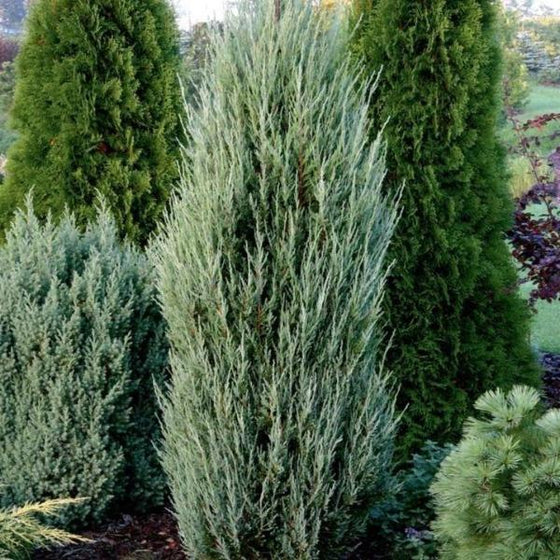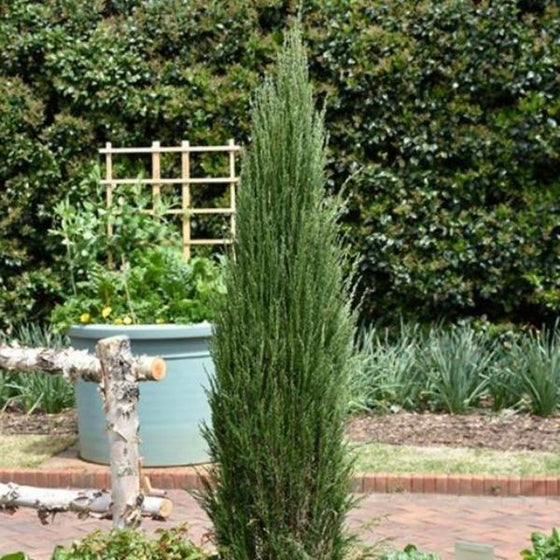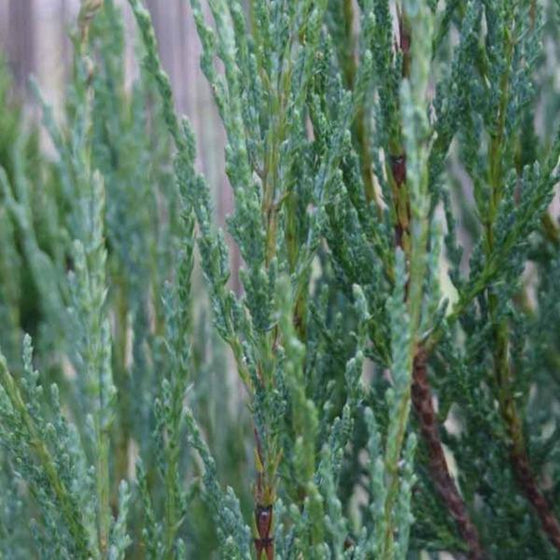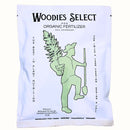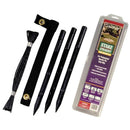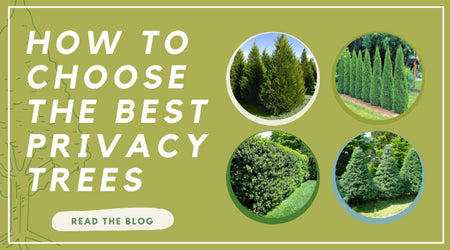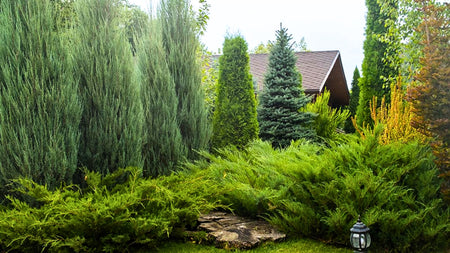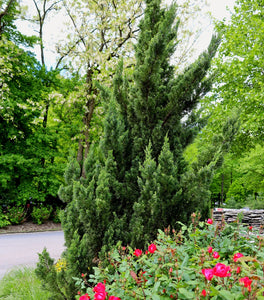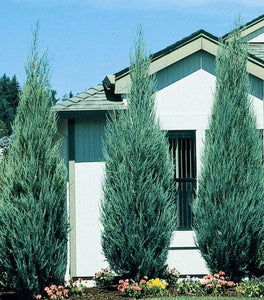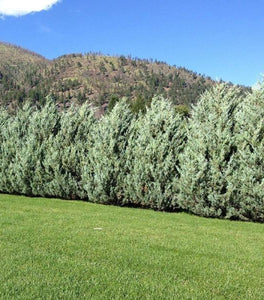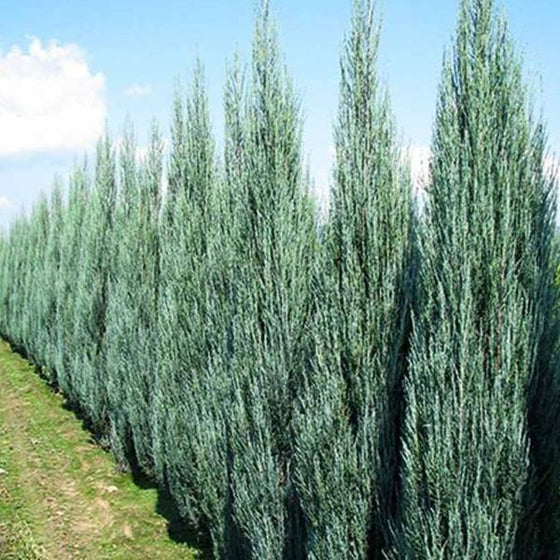
Images Depict Mature Plants
Blue Arrow Juniper – Narrow, Upright Evergreen Tree with Striking Blue Foliage
A slim evergreen with year-round style.
The Blue Arrow Juniper (Juniperus scopulorum ‘Blue Arrow’) is a tall, narrow evergreen tree prized for its striking silvery-blue foliage and dense columnar form. Perfect for tight spaces, entryway framing, and privacy screens, this tree combines strong vertical structure with vibrant color to make a dramatic statement in any landscape.
Perfect for privacy and borders.
Growing only 2–3 feet wide but reaching 12–15 feet tall, the Blue Arrow Juniper is one of the narrowest upright evergreens available. This makes it a top choice for small gardens, slim hedges, and modern landscapes where space is limited but privacy is desired. Plant in rows to create a living fence or use as a single specimen to add an eye-catching vertical accent.
Low-maintenance and hardy.
Hardy in USDA Zones 4–9, Blue Arrow Juniper is both cold-hardy and drought-tolerant once established. Its dense evergreen foliage resists deer browsing and requires little pruning to maintain its slim form. It’s an excellent choice for homeowners seeking a low-maintenance, privacy tree that provides reliable color and structure throughout the year.
Versatile design element.
Whether you’re designing a formal landscape with vertical symmetry or a natural privacy screen for a backyard, Blue Arrow Juniper adapts beautifully. Its silvery-blue foliage contrasts perfectly with green evergreens, flowering shrubs, and ornamental grasses, adding depth and texture to garden designs. If you’re looking for a narrow evergreen that combines style, strength, and easy care, Blue Arrow Juniper is unmatched.
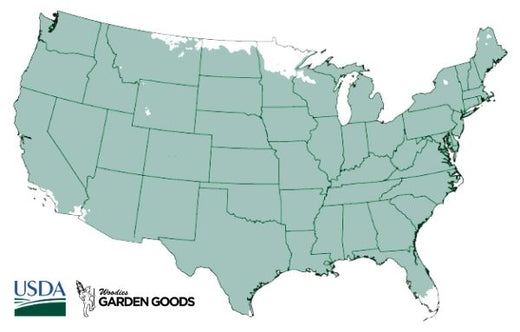
| Hardiness Zone: | 4-9 |
|---|---|
| Mature Height: | 12 to 15 Feet |
| Mature width: | 2 to 3 Feet |
| Classification: | Evergreen tree |
| Sunlight: | Full sun |
| Habit: | Upright, columnar |
| Foliage: | Powdery blue green |
| Flower Color: | Inconspicuous |
| Pruning Season: | Prune in late winter before new growth or after new growth hardens off in summer |
| Soil Condition: | Any well drained soil |
| Water Requirement: | Water well until established, then drought tolerant |
| Uses: | Tolerates heat and drought. Full sun brings out the best fall color. Will adapt to slightly moist sites |
How to Care for Blue Arrow Juniper
Before you buy a Blue Arrow Juniper Tree, make sure to read about the recommended care instructions to keep this plant healthy and flourishing.
How do I plant Blue Arrow Juniper trees?
Choose a location with full sun and well-drained soil. Dig a hole twice as wide as the root ball and just as deep. Place the tree upright, backfill halfway, water thoroughly, then finish filling and water again. For privacy screens or hedges, space Blue Arrow Junipers 2–3 feet apart to form a dense living wall. Finish by applying a 2–3 inch mulch layer around the base, keeping it a few inches away from the trunk. This helps conserve moisture and regulate soil temperature as the tree establishes.
How often should I water Blue Arrow Juniper?
Water deeply 1–2 times per week during the first growing season, allowing the soil to dry slightly between waterings. Consistent watering helps roots establish strong foundations. Once established, Blue Arrow Juniper is highly drought-tolerant, making it ideal for low-maintenance landscapes. Supplemental watering is only needed during prolonged dry spells.
When and how should I fertilize Blue Arrow Juniper?
Fertilize in early spring with a balanced, slow-release evergreen fertilizer to support healthy growth and vibrant blue foliage. Apply evenly around the drip line and water in thoroughly. Avoid over-fertilizing, as Junipers naturally grow at a moderate pace. A single spring application is typically enough to keep them thriving throughout the season.

Do Blue Arrow Junipers need pruning?
One of the biggest benefits of Blue Arrow Juniper is its naturally narrow, columnar form, which requires little to no pruning. If desired, lightly trim stray branches in late spring to maintain a neat outline. Heavy pruning is not recommended, as Junipers do not respond well to cutting into old wood. Allowing the tree to grow naturally results in the most attractive, dense form.

